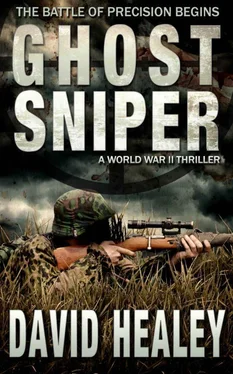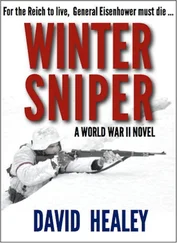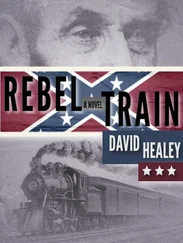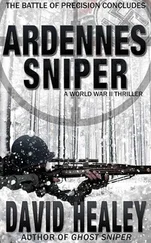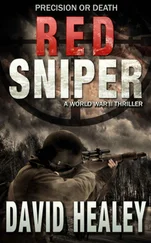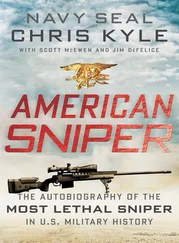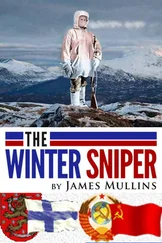Jolie snorted like a horse, which Cole thought wasn’t very French lady like, but he followed along as they headed back to join up with the other snipers. They hadn’t been able to do much good in the last firefight, but at least Meacham had recovered somewhat and didn’t look so pale.
They crossed the field and went through a gap in the hedge that opened onto a narrow dirt road. A large American squad was moving along it in the distance, and at the head of the unit Cole could see a Sherman tank. It was the first one he had seen in action away from the beach, but he wasn’t sure how much good it could do out here. The hedges were so dense and the openings between fields were so tight that tanks were confined to the country roads, which were heavily mined. In addition, German squads armed with anti-tank rockets lay in wait.
To make matters worse for the tanks, somewhere out there were heavily armored German Tiger tanks, which would be more than a match for the Sherman tanks. Above the distant rumble of the tank engine, Cole could hear the rattle of small arms fire and the heavier thump of artillery. Somebody was catching hell somewhere.
“Miss Molyneux, where does this road go?” Lieutenant Mulholland wanted to know.
“We are moving toward St. Lo,” Jolie said. “But this road does not go there directly.”
“Well, it’s a start,” Mulholland said. “We’re going to stay on this road until called upon to deploy against German snipers.”
“Lieutenant, we should let that tank up there deploy against snipers,” Vaccaro said. “Looks to me like it’s bulletproof.”
“Wouldn’t do much good,” the lieutenant said. “It would be like using a sledgehammer to drive a nail, when what you need is a hammer. And we’re the hammer.”
“Last time I got hammered, I managed to nail a sweet little English girl,” Vaccaro said. “That’s the kind of hammering and nailing I like to do.”
They all laughed at that, harder than they should have, and Chief cracked a joke about the girl costing Vaccaro not one but two cartons of cigarettes, which got them laughing harder.
They started to feel the tense mood that had come over them lift. It was funny, in a war, how you could go from being scared to death to being giddy about the simple fact of being alive, all in the space of a morning.
Their laughter was cut short, however, when they came around a bend in the narrow road and saw a handful of American troops at the side of the road, gathered around a German on his knees, with his hands raised in surrender. An American sergeant had a pistol out and it was pointed at the German’s head. He lowered the .45 when he caught sight of the approaching sniper squad.
The German was youthful and blond-haired, but he was clearly in pain. His coat was off, revealing a gray undershirt crisscrossed with suspenders, and there was a deep red stain on his side where he had been wounded. It was obvious as well from the fresh bruises and cuts on his face that he had been roughed up. Next to the soldier’s coat and helmet was a Mauser with a telescopic sight.
“What’s going on here?” Mulholland asked.
“Best just move along, sir,” the sergeant said. “We have this under control.”
“I demand to know what’s going on, Sergeant. That’s an order!”
The sergeant seemed to think it over. He was an older man, not some kid, with heavy stubble not quite obscuring the lines of exhaustion etched on his face. In civilian life he might have been a shop foreman, the kind of man used to some authority. There didn’t seem to be any officers around.
“He’s a sniper,” the sergeant said. “He shot three of our guys trying to cross a field before we winged him.”
“You know the rules, Sergeant. Captured Germans get sent to the rear.”
“Not this one. Not a sniper. They’re killers and murderers, sir, not regular soldiers.” For the first time, the sergeant seemed to notice that the lieutenant’s squad was armed with rifles that had telescopic sights. “I’m not saying that about our own men, mind you. But these are the goddamn Krauts we’re talking about.”
“I’m not so sure the Germans wouldn’t feel the same way about us,” Mulholland said.
“That’s a chance we all take, ain’t it, sir? Now, let me say it one more time. It’s best if you just move along.”
Almost imperceptibly, there seemed to be a change in the air. The squad of Americans gripped their weapons more tightly. There were at least twenty of them—and only six in their own sniper squad. Cole shifted his own weight and put a hand on his automatic. Beside him, Jolie glanced at him nervously. She had felt the tension, too. Cole looked around at the faces—exhausted, bloody, dirty—and it was clear to him that if it came down to it, these men would start shooting before they gave up their prisoner.
“Lieutenant, I reckon we ought to move out,” Cole said.
“Sir, they’re going to shoot him,” Meacham said. “That’s against all the Geneva Convention rules.”
“Shut up, Farm Boy,” Cole said. “You ain’t helping any. Last time I heard we were at war with the Germans, and I reckon that means we’re going to kill a few of them along the way. Sir?”
Mulholland didn’t move or speak, so Cole got a good grip on the handle of the .45. Here he was about to get in a shootout with their own boys, but he reckoned there were stranger things that happened in a war. He was familiar with what happened when emotions ran high and everybody had guns.
“Let’s move out,” Mulholland finally said, his voice strained.
They continued down the road, leaving the squad surrounding the German. They hadn’t gone far when there was a single pistol shot. Cole looked back and saw the German’s body at the side of the road.
“That was messed up,” Vaccaro said.
“It was wrong, just plain wrong,” said Meacham.
“Sometimes it ain’t about right or wrong,” Cole said. “It’s about gettin’ even.”
“Do you think the Germans would do that to us if we got captured?” Vaccaro asked.
“Probably,” Cole said. “But the upside of that is your chances of gettin’ killed first are pretty good.”
“You know how to cheer a guy up, Reb. Lieutenant, what do you think?”
“I think you should shut the hell up, Vaccaro. You talk too much.”
After that, the lieutenant quickened his pace and walked several steps in front of them.
“Ya’ll spread out,” Cole said.
“Who made you boss, Reb?” Vaccaro demanded.
“You want to get shot, come up here and put your arm around my shoulders so we make a better target.”
“Aw, go fuck your sister,” Vaccaro said, but he took the hint and dropped back several paces.
The rest of the squad did the same. Lieutenant Mulholland was at the front, followed by Chief, then Cole and the others, all strung out now along the road like prayer beads. Jolie walked a few paces behind Cole.
The road passed between the hedges, which created a thick wall on either side. It reminded Cole a bit too much of a cattle chute. He felt exposed and would be glad to get back into the fields, but the lieutenant seemed intent on following this road.
The squad led by the Sherman tank was just visible in the distance, moving toward a gentle hill presided over by a stone church steeple. One of the things Cole had noticed about France was all the old buildings seemed to be built of stone or brick, while back home even the oldest churches and houses were mostly clapboard. The farms here had been built to last—hell, some of the stone barns in Normandy must be centuries old. The whole countryside dripped with history.
Coming across the execution of the German sniper had cast a pall over them. It was one thing to kill the enemy when he was shooting back, but quite another to shoot a man who had his hands up in the air. Who had surrendered to you. It didn’t sit right with them. Cole had known there wasn’t a thing they could do to stop it, but the execution still nagged at him. He realized that he himself had gone down a similar road since landing on the beach yesterday morning. He had shot those prisoners in the distance out of spite—mostly to show off. And also because he’d gone a little crazy, a little off the rails. He could understand that now.
Читать дальше
